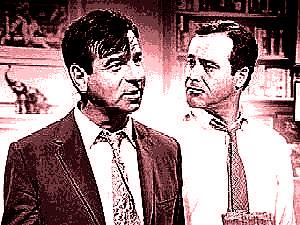Film Review
Neil Simon's award-winning play, first performed on Broadway in 1965,
made an easy transition to the big screen in this hugely successful
comedy featuring one of cinema's great double acts, Jack Lemmon and
Walter Matthau. The latter was an obvious casting choice, having
played the part of the laidback slob Oscar in the original play, but
his pairing with Lemmon is an inspiration and the two make what could
have been a humdrum sitcom into a comedy triumph. Simon was
reputed to have based the story on his observations of Mel Brooks
during a three month stay with writer Speed Vogel, following a
traumatic separation from his first wife.
With humour drawn from character rather than incident,
The Odd Couple is the model for
the perfect sitcom, and indeed it inspired a long-running TV series of
the same name, with Tony Randall and Jack Klugman playing Felix and
Oscar respectively, first aired in the US from 1970 to 1975. Neil
Simon's concept has lived through many incarnations but the one with
Matthau and Lemon is undeniably the best. The two actors had
previously worked together on Billy Wilder's
The Fortune Cookie (1966)
and had by this stage worked out an effortless comedy rapport.
Matthau is as convincing as the relaxed middle-aged slob as Lemmon is
as the house-proud neurotic and the clash of these two diametrically
opposed personalities is perfectly calibrated to reduce an audience to
hysterics. The film became such a cult classic that Matthau and
Lemmon returned in a sequel,
The Odd
Couple II (1998).
© James Travers 2010
The above content is owned by frenchfilms.org and must not be copied.
Film Synopsis
Felix Ungar is a New York newswriter who decides that life is no longer
worth living after his wife tells him she wants a divorce. After
a bungled suicide attempt, he shows up at the apartment of his best
friend, sportswriter Oscar Madison. The latter has got over his
divorce and is happily rediscovering the joys of the old bachelor life,
playing poking all night and generally living like a slob.
Fearing that Felix may try to harm himself, Oscar persuades him to move
into his apartment. It is an offer that he soon regrets
making. Felix is compulsively tidy and soon transforms Oscar's
filthy pigsty into a home fit for a king. Instead of makeshift
meals that look like the end-product of a misguided biological
research programme, Oscar's stomach becomes reacquainted with real
food, thanks to Felix's unrivalled culinary talents. But far from
being grateful, Oscar is driven to the edge of sanity by his friend's
obsessive tidiness. As much as Oscar loves Felix, he knows that,
sooner or later, he will have to kill him...
© James Travers
The above content is owned by frenchfilms.org and must not be copied.


